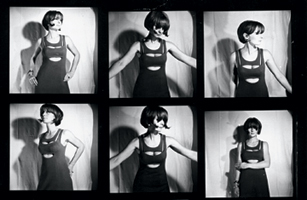
FASHION SHOOT: Rykiel in a dress she designed for her husband's boutique, three years before opening her own
In May 1968, Sonia Rykiel opened her first boutique on Paris' Left Bank. As student protests threw the country into upheaval, Rykiel staged a revolution of her own, creating clothing that bypassed the rules of the fashion establishment and empowered women to adapt styles to their own tastes. Forty years on, the Musée des Arts Décoratifs in Paris pays homage to the pioneering couturière with "Sonia Rykiel, Exhibition" (through April 19), a colorful meditation on curator Olivier Saillard's words: "The history of contemporary fashion starts with Sonia Rykiel."
In a space that evokes a Haussmann-style apartment, 220 Rykiel creations, along with catwalk videos and fashion photographs, track the designer's rise to stardom. Saillard believes that ascent reflected a dramatic shift in the fashion world: the eclipse of haute couture by ready-to-wear. As a young, active, recently divorced mother in 1968, Rykiel found couture's stiff shoulder pads and starched fabrics woefully incompatible with the lives of modern women. So she decided to "make clothes that were tailored for me, and not for someone else," she says.
In the search for lightness and fluidity, Rykiel, now 78, abandoned hems and linings (which weigh dresses down and restrict movement) and turned seams inside out. Piece by piece, Rykiel created a uniform of slim-fitting jersey tops, sleek knitted dresses and boyish trousers. With each collection, her designs evolved only in color and material, defying the commercial notion of fashion's seasonal death and rebirth.
Coaxing women to ignore the industry's diktats and tailor their own image is central to Rykiel's philosophy: la démode. "Only a woman can know what she has that is beautiful or ugly; what she should highlight, what she should hide," she says. Her catwalk models may have been the first to shed their bras and strut with disarming nonchalance, but Rykiel is patently antinatural. "When you wake up in the morning, you are natural — that is to say abominable," she says, paraphrasing Charles Baudelaire. Her trompe l'oeil designs, sequined cocktail dresses and ubiquitous use of curve-melting black reveal a dandy's love of artifice that the French poet would have appreciated.
Today, women around the globe wear Rykiel's creations, but the woman she says she designs for still sounds suspiciously like herself. "She's intellectual, political, curious about the world," says Rykiel. "She's also the woman who comes into the store wanting a dress because her lover left her, the way a woman who leaves her husband runs into the first pastry shop she finds. She is by no means an ideal woman, she has many faults. But for me, she is a very interesting woman." Visitors to "Sonia Rykiel, Exhibition," will no doubt agree.